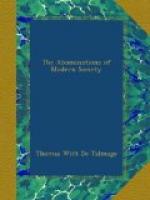I maintain that the question of sobriety is higher than the question of availability; and that however eminent a man’s services may be, if he have habits of intoxication, he is unfit for any office in the gift of a Christian people. Our laws will be no better than the men who make them.
Spend a few days at Harrisburg, or Albany, or Washington, and you will find out why, upon these subjects, it is impossible to get righteous enactments.
Again, we will war upon this evil by organized societies. The friends of the rum traffic have banded together; annually issue their circulars; raise fabulous sums of money to advance their interests; and by grips, pass-words, signs, and stratagems set at defiance public morals. Let us confront them with organizations just as secret, and, if need be, with grips, and pass-words, and signs maintain our position. There is no need that our philanthropic societies tell all their plans.
I am in favor of all lawful strategy in the carrying on of this conflict. I wish to God we could lay under the wine-casks a train, which, once ignited, would shake the earth with the explosion of this monstrous iniquity.
Again: we will try the power of the pledge. There are thousands of men who have been saved by putting their names to such a document. I know it is laughed at; but there are men who, having once promised a thing, do it. “Some have broken the pledge.” Yes; they were liars. But all men are not liars. I do not say that it is the duty of all persons to make such signature; but I do say that it will be the salvation of many of you.
The glorious work of Theobald Mathew can never be estimated. At his hand four millions of people took the pledge, including eight prelates, and seven hundred of the Roman Catholic clergy. A multitude of them were faithful.
Dr. Justin Edwards said that ten thousand drunkards had been permanently reformed in five years.
Through the great Washingtonian movement in Ohio, sixty thousand took the pledge. In Pennsylvania, twenty-nine thousand. In Kentucky, thirty thousand, and multitudes in all parts of the land. Many of these had been habitual drunkards. One hundred and fifty thousand of them, it is estimated, were permanently reclaimed. Two of these men became foreign ministers; one a governor of a State; several were sent to Congress. Hartford reported six hundred reformed drunkards; Norwich, seventy-two; Fairfield, fifty; Sheffield, seventy-five. All over the land reformed men were received back into the churches that they had before disgraced; and households were re-established. All up and down the land there were gratulations, and praise to God. The pledge signed, to thousands has been the proclamation of emancipation.




